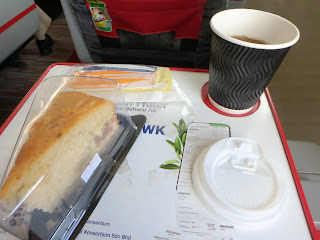Study Trip to Macau, Zhu Hai, Shen Zhen, Dong Guan and Hong Kong
Study Trip to Macau, Zhu Hai, Shen Zhen, Dong Guan and Hong Kong
Between 9 Oct and 15 Oct. 2008, 4 Singaporeans proceeded to the Pearl River region of Macau, Zhu Hai, Shen Zhen, Dong Guan and Hong Kong to observe and formulate opinions of the social characteristics exhibited in the said regions. The formulations are for the purposes of understanding China and the SARs and its people. Evidently the observations centred on routine activities such as hailing taxis to obtaining services from the various retail outlets such quality of service and comfort.
The study trip was arranged such that any events that occurred were sporadic and spontaneous by nature. To facilitate trip guidance, a broad framework of objectives was developed as it provides directions. However, the actual implementation was sporadic and the programme amended to suit the situation of the day.
For data collection and assessment, a simple assessment was done on hospitality, value for money, quality of goods and service, honesty and financial motives were considered. A detailed case study was considered cost and time prohibitive and not in the group’s interest due to its numerous objectives. Thus analysis was carried only from the 4’s collative views.
In general, Zhu Hai and Shen Zhen displayed sufficient economic vibrancy to suggest that the external economic crisis have not percolated into the local economy in the two cities. The large domestic consumption has probably buffered local businesses from the recessionary tide. Shen Zhen has showed even less effects of an economic slowdown with shops along Hua Qiang Bei Road/Fu Hua Road in Fu Tian district being chock-a-bloc with business activities.
This observation collaborates with Reuters (Fri Oct 17, 2008 11:15am) report that Chinese exports rose 21.5 percent in September from a year earlier and 21.1 percent in August. However, as the credit crisis on the world economy deepens it was certain to impact and slow demand. Mr Chen Deming, Chinese Commerce Minister was reported to have said, "Our exports were relatively good from January to September...we haven't really seen any impact from the financial crisis,"
For Shen Zhen, the economic vibrancy exists from its symbiotic relation with Hong Kong and of the special economic zone status. For areas like Zhu Hai and Dong Guan, the close proximity to a larger economic centre allowed for mutual dependencies such as lower cost of sale and hospitality services. Ching Cheong wrote that China was well-positioned to ride out the financial crisis because of it ideological and planned approach to market and cited Paul Krugman belief that ideology has a part to play in the current crisis. “Why was this allowed to happen? At a deep level, I believe that the problem was ideological: policymakers, committed to the view that the market is always right, simply ignore the warning signs.” (Straits Times, Oct 18, 2008).
Dong Guan, according to a commentator possesses the basic infrastructure of the larger cities. However the city suffers from the weakness of poor integration and lackluster standard of system planning. It could be considered a city with a follower mentality resulting in hotchpotch implementation from the intention in meeting minimal general expectations. An example is the train station layout where weakness of integration and piece-meal implementation is present.
At the individual level, the “two face” characteristic of the Chinese (i.e. one attitude for local and one for tourist) proofed elusive to detect. Nevertheless we believe that most Chinese would consider the unsuspecting, unfamiliar and foreign as large economic units for value extraction to the hilt.
However this sort of activities was balanced by the good service level exhibited by retail outlets or taxis drivers who seemed to be concern with meeting customers’ expectation.
In comparison, Hong Kong (HK) and Macau also exhibited a consistent and high service standard, thus making one feel relatively comfortable and unexploited. Perhaps, this phenomenon has its origins in the level of culture sophistication and the linked social civic-ness. Economically, Macau while being relatively cheaper than HK does not offer much as the main revenue streams are gambling related. Macau would presumably suffer severely under the current crisis (The Business Times, Oct 18, 2008). In order to gain sufficient numbers, the mainland would be an important source of revenue for this enclave. HK on the other hand, being a more cosmopolitan society with diversified portfolio would weather the storm better than Macau.
Our assessment indicate that the Pearl River region provides a positive experience for the casual visitor in terms of service quality and value for money; the single most attributable factor being the positive attribute of putting service levels ahead of economic value extraction. It is in sharp contrast with the Singapore’s emphasis of extracting maximum value over providing good service. To that end, the Singapore approach of general depersonalisation in business and social circles should be a cause for concern. Whilst Singapore may have the hard statistics of a better infrastructure and competitiveness (The Business Times, Fri, Sep 26, 2008); it may be the “soft” aspects of accommodation and personalization that would prove to be differentiating factor in the longer term.
Between 9 Oct and 15 Oct. 2008, 4 Singaporeans proceeded to the Pearl River region of Macau, Zhu Hai, Shen Zhen, Dong Guan and Hong Kong to observe and formulate opinions of the social characteristics exhibited in the said regions. The formulations are for the purposes of understanding China and the SARs and its people. Evidently the observations centred on routine activities such as hailing taxis to obtaining services from the various retail outlets such quality of service and comfort.
The study trip was arranged such that any events that occurred were sporadic and spontaneous by nature. To facilitate trip guidance, a broad framework of objectives was developed as it provides directions. However, the actual implementation was sporadic and the programme amended to suit the situation of the day.
For data collection and assessment, a simple assessment was done on hospitality, value for money, quality of goods and service, honesty and financial motives were considered. A detailed case study was considered cost and time prohibitive and not in the group’s interest due to its numerous objectives. Thus analysis was carried only from the 4’s collative views.
In general, Zhu Hai and Shen Zhen displayed sufficient economic vibrancy to suggest that the external economic crisis have not percolated into the local economy in the two cities. The large domestic consumption has probably buffered local businesses from the recessionary tide. Shen Zhen has showed even less effects of an economic slowdown with shops along Hua Qiang Bei Road/Fu Hua Road in Fu Tian district being chock-a-bloc with business activities.
This observation collaborates with Reuters (Fri Oct 17, 2008 11:15am) report that Chinese exports rose 21.5 percent in September from a year earlier and 21.1 percent in August. However, as the credit crisis on the world economy deepens it was certain to impact and slow demand. Mr Chen Deming, Chinese Commerce Minister was reported to have said, "Our exports were relatively good from January to September...we haven't really seen any impact from the financial crisis,"
For Shen Zhen, the economic vibrancy exists from its symbiotic relation with Hong Kong and of the special economic zone status. For areas like Zhu Hai and Dong Guan, the close proximity to a larger economic centre allowed for mutual dependencies such as lower cost of sale and hospitality services. Ching Cheong wrote that China was well-positioned to ride out the financial crisis because of it ideological and planned approach to market and cited Paul Krugman belief that ideology has a part to play in the current crisis. “Why was this allowed to happen? At a deep level, I believe that the problem was ideological: policymakers, committed to the view that the market is always right, simply ignore the warning signs.” (Straits Times, Oct 18, 2008).
Dong Guan, according to a commentator possesses the basic infrastructure of the larger cities. However the city suffers from the weakness of poor integration and lackluster standard of system planning. It could be considered a city with a follower mentality resulting in hotchpotch implementation from the intention in meeting minimal general expectations. An example is the train station layout where weakness of integration and piece-meal implementation is present.
At the individual level, the “two face” characteristic of the Chinese (i.e. one attitude for local and one for tourist) proofed elusive to detect. Nevertheless we believe that most Chinese would consider the unsuspecting, unfamiliar and foreign as large economic units for value extraction to the hilt.
However this sort of activities was balanced by the good service level exhibited by retail outlets or taxis drivers who seemed to be concern with meeting customers’ expectation.
In comparison, Hong Kong (HK) and Macau also exhibited a consistent and high service standard, thus making one feel relatively comfortable and unexploited. Perhaps, this phenomenon has its origins in the level of culture sophistication and the linked social civic-ness. Economically, Macau while being relatively cheaper than HK does not offer much as the main revenue streams are gambling related. Macau would presumably suffer severely under the current crisis (The Business Times, Oct 18, 2008). In order to gain sufficient numbers, the mainland would be an important source of revenue for this enclave. HK on the other hand, being a more cosmopolitan society with diversified portfolio would weather the storm better than Macau.
Our assessment indicate that the Pearl River region provides a positive experience for the casual visitor in terms of service quality and value for money; the single most attributable factor being the positive attribute of putting service levels ahead of economic value extraction. It is in sharp contrast with the Singapore’s emphasis of extracting maximum value over providing good service. To that end, the Singapore approach of general depersonalisation in business and social circles should be a cause for concern. Whilst Singapore may have the hard statistics of a better infrastructure and competitiveness (The Business Times, Fri, Sep 26, 2008); it may be the “soft” aspects of accommodation and personalization that would prove to be differentiating factor in the longer term.


Comments